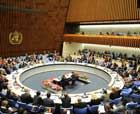Updated with Dr. M. Chan's closing remarks:
A Global Alcohol Strategy adopted by the World Health Assembly
The World Health Assembly passed on the 20th of May a resolution endorsing a Global Strategy to Reduce the Harmful Use of Alcohol. It was a very interesting discussion in the Assembly where some 35 member states spoke - all in favour of the strategy. Three NGOs/civil society alliances also made statements supporting the resolution.
- The decision of the World Health Assembly on a Global Alcohol Strategy is a very important step forward in the global struggle for public health and welfare, says General Secretary Morten Lønstad of FORUT; The Norwegian Campaign for Development and Solidarity.
 Mr. Lønstad (picture to the right) says that the decision is of particular importance for the developing world – and for all NGOs concerned with global development issues. – It is a sad fact that drunken behaviour is closely linked to many critical development issues; like poverty, marginalization, gender-based violence and HIV/AIDS. A concerted effort by the international community to reduce harmful drinking, under the leadership of WHO, is therefore very good news in particular for the poor and for children and women all over the world.
Mr. Lønstad (picture to the right) says that the decision is of particular importance for the developing world – and for all NGOs concerned with global development issues. – It is a sad fact that drunken behaviour is closely linked to many critical development issues; like poverty, marginalization, gender-based violence and HIV/AIDS. A concerted effort by the international community to reduce harmful drinking, under the leadership of WHO, is therefore very good news in particular for the poor and for children and women all over the world.
GAPA: "A historic decision"
The Global Alcohol Policy Alliance (GAPA) warmly welcomes the new Alcohol Strategy and calls this a “historic decision” by the World Health Organization. GAPA has represented many NGOs in the process leading up to the adoption of the strategy. GAPA chairman Derek Rutherford said: "Concerted action to reduce global alcohol problems is long overdue. Today's decision by the World Health Assembly is an important first step to address them. The strategy goes a long way in recognizing the transnational aspects of the alcohol issue. GAPA appreciates the wide range of supportive statements by WHO member states from both developed and developing countries in the discussion."
In the two-hour-long debate at the Assembly, all member states acknowledged the harmful use of alcohol as a major public health issue. In the many member-state interventions, delegates pointed to the global aspects of the problem and requested that alcohol problems receive a higher priority at WHO and that more resources be allocated to address those problems and to implement the new global strategy.
Evidence-based measures
The important concerns identified in the debate included the increasing culture of binge drinking among young people world wide, and the expanding influence of the marketing and advertising for alcoholic beverages. Delegates welcomed the varied evidence-based measures included in the strategy and their potential for successfully addressing alcohol problems. The strategy highlights the effectiveness of focusing on policies regarding pricing, availability and marketing of alcohol. The WHA resolution was adopted with one amendment proposed by Thailand on behalf of the SEARO countries asking for adequate financial and human resources for implementation
Alcohol policy - a development issue
FORUT points to the fact that alcohol constitutes a double-sided problem in the developing world. - On one hand, drinking is in many places a severe and additional burden to the poor and underprivileged. On the other hand we also see that new drinking habits, increasing consumption levels, and rising problems occur among a growing middle class in a number of countries. Planned and evidence-based strategies is the best way to prevent new problems from arising, and the new WHO Strategy points at many effective alternative actions for governments as well as for NGOs, says Morten Lønstad of FORUT.
"A true breakthrough"
In her closing remarks at the World Health Assembly Dr Margaret Chan, Director-General of the World Health Organization, said that the agreements at the Assembly are a gift to public health. Commenting on the discussions of Non-Communicable Diseases and Alcohol she told the delegates: "You have given public health a policy instrument and guidance for tackling one of the world’s fastest growing and most alarming health problems. This is the rise of chronic noncommunicable diseases, like cardiovascular disease, cancer, diabetes, and chronic respiratory disease.
More information:
WHO press relase: Call for action to reduce the harmful use of alcohol
Dr Margaret Chan, Director-General of the World Health Organization, Closing remarks at the Sixty-third World Health Assembly: Agreements at World Health Assembly a gift to public health
Reuters covering the story: WHO to tackle alcohol misuse, binge drinking
European Centre for Monitoring Alcohol Marketing: New Global Alcohol Strategy supports limiting the impact of alcohol marketing.
RELATED ARTICLES
- New report highlights benefits of policy measures to prevent harmful alcohol consumption
- WHO consultation on global alcohol strategy and the way forward
- Alcohol use - a barrier to health and to the achievement of the SDGs
- Government investments in alcohol industry up against the wall
- Abstracts for GAPC 2020 – deadline 29 July 2019
- A regional African alcohol coordination mechanism is needed
- New book reveals a series of unethical business practices by Heineken in Africa
- SAAPA applauds WHO position on no industry collaboration
- Next GAPC to be held in Dublin in March 2020
- SAFER – a new WHO initiative to boost national alcohol policy processes

